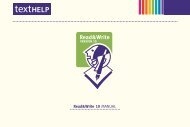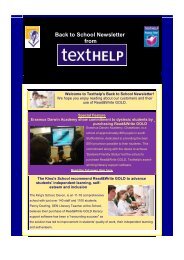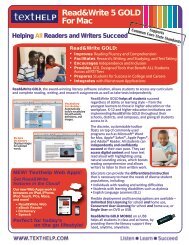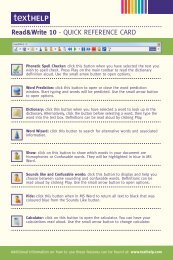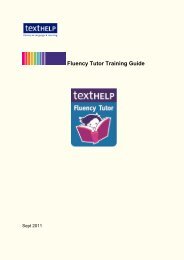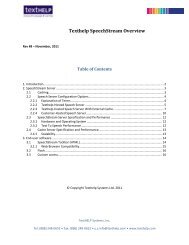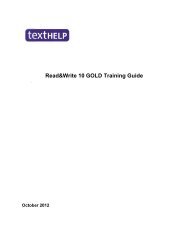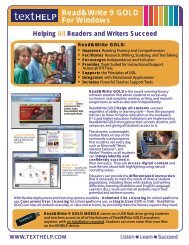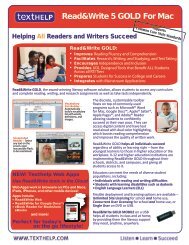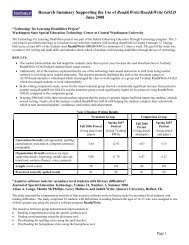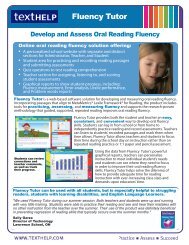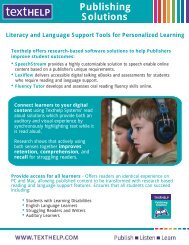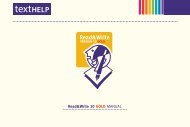01 NRDC Dyslexia 1-88 update - Texthelp
01 NRDC Dyslexia 1-88 update - Texthelp
01 NRDC Dyslexia 1-88 update - Texthelp
You also want an ePaper? Increase the reach of your titles
YUMPU automatically turns print PDFs into web optimized ePapers that Google loves.
158<br />
Research Report<br />
Function Checklist item Observations<br />
Reading/ decoding<br />
cont.<br />
Dislikes reading aloud (29)<br />
Might indicate a word recognition or<br />
decoding problem, or social selfconsciousness.<br />
Takes longer than expected to<br />
read a page of a book (30)<br />
As there is no representative ‘page’ and<br />
no representative ‘reader’, this is a<br />
necessarily subjective judgement. There<br />
might be a problem with reading rate<br />
despite accurate word recognition and<br />
decoding, or a conceptual difficulty with<br />
a complex text, or progress slowed by<br />
puzzling misreadings.<br />
Dislikes reading long books (32)<br />
Similarly, this might indicate a problem<br />
with reading rate despite accurate word<br />
recognition and decoding, or a<br />
conceptual difficulty with a complex<br />
text, or progress slowed by puzzling<br />
misreadings.<br />
Does not read for pleasure (41)<br />
Once again, this might indicate a<br />
problem with reading rate despite<br />
accurate word recognition and<br />
decoding, or a conceptual difficulty with<br />
a complex text, or progress slowed by<br />
puzzling misreadings.<br />
Loses place or jumps lines when<br />
reading (49)<br />
Might indicate a problem with verbal<br />
short-term memory, or a problem with<br />
oculomotor control.<br />
Confuses morphologically similar<br />
words when speaking (52)<br />
Confuses orthographically<br />
similar words when reading (53)<br />
Might be a temporary characteristic of a<br />
relatively inexperienced reader.<br />
Confuses semantically similar<br />
words (54)<br />
Might be a temporary characteristic of a<br />
relatively inexperienced reader.<br />
Spelling/<br />
encoding<br />
Experiences continuous<br />
problems with spelling the same<br />
word differently in one document<br />
(20)<br />
Might indicate lack of systematic<br />
learning or teaching.<br />
Spells poorly (33)<br />
Ambiguous, as some spelling errors<br />
indicate a partial mastery of the<br />
alphabetic system (such as the<br />
regularisation of irregular words, or<br />
failure to observe rules for consonant<br />
doubling) while others might indicate<br />
fundamental misunderstanding or lack<br />
of knowledge.



